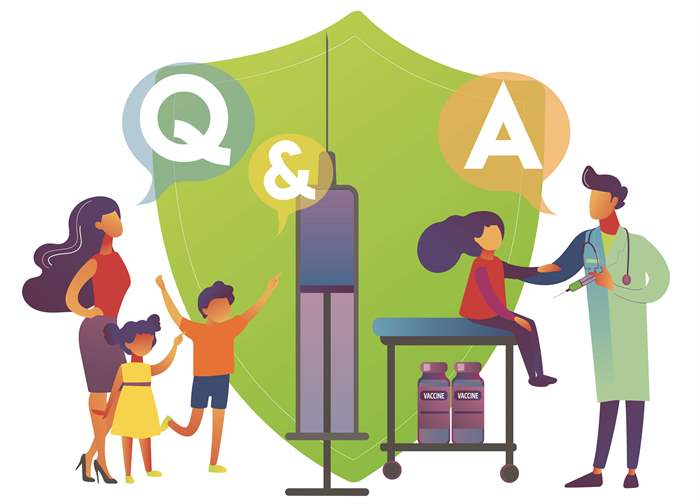Published
on
September 18, 2020
| 3,544 views
| 1 follower
members are following updates on this item.

Routine immunizations are essential preventive care for children, adolescents, and adults. They help keep you, your children, and our community safe. Dr. Celina Clift is a board-certified pediatrician at Tanana Valley Clinic and counsels parents and children every day about the importance of immunizations. Dr. Dacey Brooke was a third-year pediatric resident doctor from Seattle Children’s Hospital, who completed part of her pediatric training here in Fairbanks. Drs. Clift and Brooke share their valuable immunization advice:
Q. First of all, how do vaccines work?
A. The vaccines that we administer are dead, or a weakened version of the germ, or part of the germ that causes the disease in question. When we are exposed to the germ in vaccine form, our immune system, which is the body's germ-fighting machine, is able to create infection-fighting proteins called antibodies. Antibodies protect us from contracting the disease if and when we are exposed to the actual disease.
Q. Why are immunizations important?
A. Vaccinations not only protect your child from deadly diseases, such as polio, tetanus, and diphtheria, but they also keep other children safe by eliminating or greatly decreasing dangerous diseases that used to spread from child to child.
It is always better to prevent a disease than to treat it after it occurs.
Q. What are the recommended immunizations for children by age?
A. You can find the recommended vaccine schedule at www.cdc.gov
Q. What is the best way to keep track of immunizations?
A. It is recommended that parents keep a careful record of your child’s shots. Although your doctor's office will also keep track, people change doctors, records get lost, and the person ultimately responsible for keeping track of your child's immunizations is you. Ask your child’s doctor for an immunization record form.
We recommend that you think about your child's record as you would a birth certificate and keep it with your other essential documents.
Q. We’ve missed a few immunizations. What should we do?
A. If your child missed a dose of vaccine, they do not need to start the whole series over again, and they can pick up where they left off. The previous immunizations are still effective, and your doctor will just resume the immunization schedule. If you are due for immunizations, it is recommended that you contact your provider to catch up on vaccinations now.
Q. I’ve heard that the MMR immunization can cause autism – is that true?
A. We understand your concern and no, it is not true. The misbelief that vaccinations lead to autism dates back to a study published in 1998 that has been discredited. Since then, numerous scientific studies have been reviewed and do not support a link between vaccines — or any of their ingredients — and autism.
Q. Can getting multiple vaccines at once harm my baby?
A. The recommended vaccine schedule is safe for your baby.
Babies have stronger immune systems than you might think, and they can handle far more germs than what they receive from vaccines.
In fact, the number of germs in vaccines is just a small percentage of the germs babies' immune systems deal with every day. Occasionally, kids can have a reaction to a vaccine like a mild fever or rash. But the risk of reactions is small compared with the health risks associated with the diseases they prevent, and do not happen because the baby got several vaccines at once.
Q. Do you have children and did your children receive the recommended vaccines?
A. Absolutely they did, and here’s why:
Immunizations protect children from disease. Medical advances mean that children can be protected against many serious diseases. In fact, several diseases that historically killed thousands have now been completely eradicated, and many are close to extinction due to effective vaccines.
Vaccinations are safe and effective. Doctors, scientists and health care researchers only approve vaccines after long and careful reviews. Even though vaccines may cause some discomfort, it is minimal compared to the pain and discomfort caused by the onset of these diseases. Side effects of the vaccinations, such as allergic reactions, are uncommon, and the disease-prevention benefits of getting vaccinations are actually much higher than the possible side effects for almost all children.
Childhood vaccines contribute to herd immunity. We’ve heard the term herd immunity related to COVID-19, but it has been around a long time and is central to the theory behind vaccination. It means that when enough people are immune to a disease, the spread of the disease slows down a lot. This protects people who are too young for certain vaccines (such as newborn babies) and people who have problems with their immune systems. Once a large proportion of a community is immune to a disease, it can reduce the transmission of this disease and protect vulnerable individuals. Therefore, getting your child vaccinated not only helps your own child, but can help keep others safe as well.
Q: Why is it important to get my family vaccinated against influenza?
A: It is important to get vaccinated against the influenza virus (“the flu”) every year, as the flu can be a serious infection that may lead to hospitalization and death.
It is also possible to get the flu, COVID-19, or other circulating infections at the same time.
Flu vaccines reduce the risk of flu illness and hospitalization, and will also help decrease the spread of flu in our community. Decreasing the number of flu cases helps prevent hospitals from becoming overwhelmed with influenza related illness during the respiratory season. Individuals with flu-like symptoms may have many missed work or school days. By getting the flu vaccine, your chance of having these symptoms is greatly reduced.
If you have questions about immunizations or the health care of your children, please contact the Foundation Health Partners Pediatrics Clinic at 907-459-3520.
Page Options